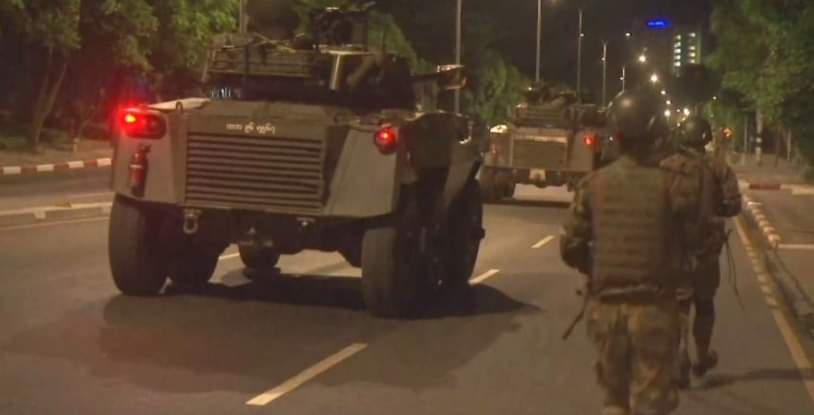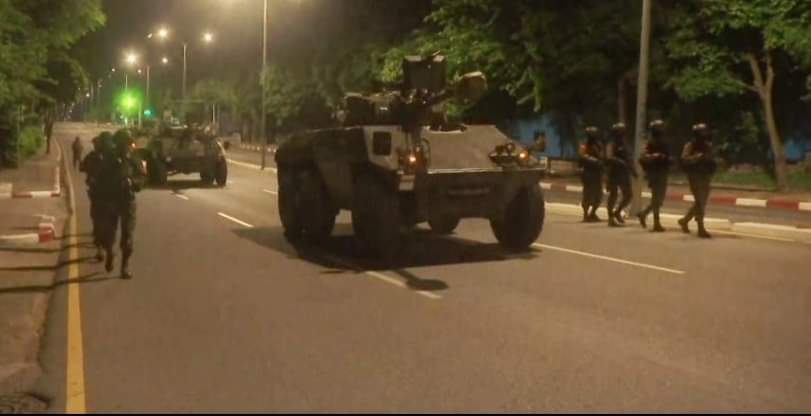Although it is just 7 pm, Ko Min Min and his workers are busy shutting down their food stall in Yangon’s North Dagon Township. Two weeks ago, it was open till 9 pm as the street it is on – commonly known as Mandalay Road – was crowded with diners enticed by the abundance of roadside food stalls.
The once bustling road has become a ghost town. Vendors and food sellers shut after sunset. Their customers are now racing home after work.
What alarms them is talk that the regime’s military is grabbing young people off the streets and even from teashops to work as porters.
Nightly patrols by armed vehicles and increased security in the former capital only add to the panic.
“We heard the news about people being taken [to work as military] porters and that their family members have been extorted for money in order to release them,” Ko Min Min said. “So, we are closing our stalls early,” he explained.
Talk that the Tatmadaw is rounding up civilians to work as porters is difficult to confirm, but it is would not be the first time. Myanmar’s military has a notorious record of forcing civilians to work at the front lines, especially when it being defeated.
It has been struggling against a wave of attacks by ethnic armed groups and resistance forces at multiple fronts in the country’s heartland, northeast, northwest and southeast. Since late last month, the junta has suffered heavy casualties and lost more than 160 bases by November 22.
Tea conscription
“We heard that soldiers stormed into a tea shop in Hlaing Thar Yar [township] to grab men for porters as they were sitting in the tea shop. That’s why people don’t go outside at night,” a resident of the township on the outskirts of Yangon told The Irrawaddy.
Following daring attacks on towns in Rakhine and Chin States as well as the capital of Kayah State, armored vehicles began patrolling Yangon. The troops they carried conducted strict inspections at night. Residents say the inspections include assaulting and arresting civilians, as well as robbery and extortion.

A resident of South Dagon Township said junta troops beat and robbed him while he was returning home one night last month. The attack began with a punch in the face, he told The Irrawaddy. “They stole all my money before they let me go,” he added.
Incidents like this are encouraging city residents to rush to the safety of their homes right after work, Ko Min Min said, adding that a palatable sense of insecurity had gripped the city.
Some taxi drivers are refusing to drive at night. One explained that he does not drive late at night because of military patrols and reports of forced conscription even though it reduces his income.
General denial
Regime spokesperson Major General Zaw Min Tun denied Wednesday reports that the military was rounding up civilians to work as porters. “There is no reason for the military to do this … anywhere in Myanmar,” he said.

Some pro-junta media, however, admit that civilians are being arrested. They claim, however, that those arrested are members of the People’s Defense Forces (PDFs).
“Many PDFs have entered Yangon and Mandalay in the last two weeks,” NP news reported. “Some people were captured because they got the news in advance. That’s why the porter news is spreading,” it claimed.
Between 40 and 50 youths were arrested in Yangon on November 23 after they attended a PDF training session, NP news said.
The reappearance of regime soldiers in public schools is also stoking public alarm in Yangon. The last time the showed up in schools was immediately after the February 2021 coup when soldiers were placed in public schools and hospitals to swiftly crack down on anti-regime protests near the venues.
Soldiers are now back in schools in South Dagon, Thingangyun, Hlaing Thar Yar, South Okkalapa and North Okkalapa townships, residents say.
“I don’t dare to send my child to school,” a parent told The Irrawaddy.

















